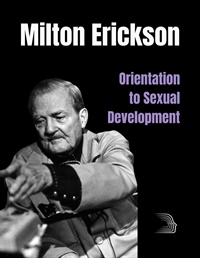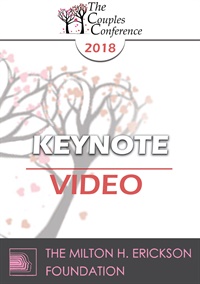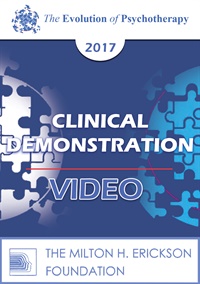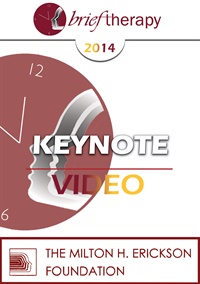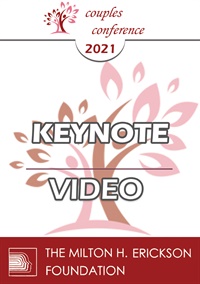
Credit available - Click Here for more information
- Average Rating:
- Not yet rated
- Topic Areas:
- Couples Therapy | Sex and Sexuality | Continuing Education | LGBTQ | Gender | Keynotes | Relationships
- Categories:
- Couples Conference | Couples Conference 2021 | Online Continuing Education
- Faculty:
- Joseph Winn, MSW, LICSW, CST-S
- Course Levels:
- Master Degree or Higher in Health-Related Field
- Duration:
- 1 Hour 2 Minutes
- Format:
- Audio and Video
- Original Program Date:
- Jun 06, 2021
- Short Description:
- This keynote will highlight core themes that are imperative for therapists to consider before working with relational systems that exist beyond the purview of heteronormativity. Specific topics will include becoming aware of ones sexological world views, understanding and working with sexual and relational health, and exploring what variant sexual, erotic and relational systems may offer heteronormative and monogamous couples in terms of increasing vulnerability, differentiation, and deepening relational attunement.
- Price:
- $29.00 - Base Price
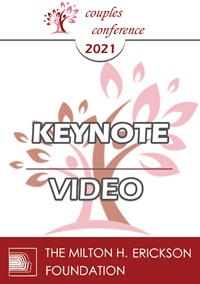
Credit available - Click Here for more information
- Average Rating:
- Not yet rated
- Topic Areas:
- Couples Therapy | Sex and Sexuality | Intimacy | Keynotes
- Categories:
- Couples Conference | Couples Conference 2021 | Online Continuing Education
- Faculty:
- Martha Kauppi, MS MFT
- Course Levels:
- Master Degree or Higher in Health-Related Field
- Duration:
- 1 Hour 3 Minutes
- Format:
- Audio and Video
- Original Program Date:
- Jun 06, 2021
- Short Description:
- Desire resides at the intersection of multiple systems, encompassing purely sexual aspects, numerous physiologic components, and a vast web of emotional, spiritual, and relational issues. In this skills-based presentation, Martha shares her approach to understanding complicated interconnected presenting symptoms, relational dynamics, and conceptualizing and treating issues related to desire.
- Price:
- $29.00 - Base Price
- Average Rating:
- Not yet rated
- Topic Areas:
- Milton Erickson | Sex and Sexuality | Ericksonian Hypnosis and Therapy Techniques | Storytelling | Strategic Therapy | Experiential Therapy | Hypnosis
- Categories:
- Erickson Materials | Erickson Streaming Video Collection | Milton H. Erickson Collections
- Course Levels:
- Master Degree or Higher in Health-Related Field
- Duration:
- 1 Hour 8 Minutes
- Original Program Date:
- Sep 24, 2020
- Short Description:
- In Part 2 of Dr. Erickson’s Orientation to Sexual Development, Milton Erickson continues his interesting lecture about the natural developmental processes involved with sexual/relational maturity. This video begins with Erickson telling charming stories of his sons sexually and relationally developing, which illustrate the principles outlined in the video.
- Price:
- $19.95 - Base Price
Credit available - Click Here for more information
- Average Rating:
- Not yet rated
- Topic Areas:
- Sex and Sexuality | Couples Therapy | Ericksonian Hypnosis and Therapy Techniques | Milton Erickson | Children and Adolescent Therapy | Humor | Hypnosis
- Categories:
- Erickson Materials | Erickson Streaming Video Collection | Milton H. Erickson Collections | Online Continuing Education
- Faculty:
- Jeffrey Zeig, PhD | Milton H. Erickson, MD
- Course Levels:
- Master Degree or Higher in Health-Related Field
- Duration:
- 1 hour
- Format:
- Audio and Video
- Original Program Date:
- Jul 07, 2020
- Short Description:
- In this video, Dr. Milton Erickson describes sexual development — from infancy to adulthood, with a focus on male sexual maturation. As Erickson’s describes sexual development, the viewer feels as if they are going through the process as well. Erickson also includes humorous anecdotes of his children as they grew into adults. At the end of the video Dr. Jeffrey Zeig comments on Erickson’s fascinating teaching methods and communication techniques.
- Price:
- $19.95 - Base Price
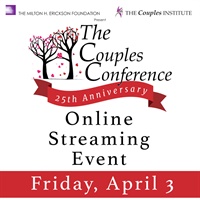
Credit available - Click Here for more information
- Average Rating:
- 28
- Topic Areas:
- Couples Therapy | Conflict | Developmental Therapy Model | IMAGO | Infidelity | LGBTQ | Relational Life Therapy Model (RLT) | Relationships | Sex and Sexuality
- Categories:
- Couples Conference | Couples Conference 2020 | Online Continuing Education
- Faculty:
- Ellyn Bader, PhD | Joseph Winn, MSW, LICSW, CST-S | Terry Real, LICSW | Harville Hendrix, PhD | Helen LaKelly Hunt, PhD | Martha Kauppi, MS MFT | Stan Tatkin, PsyD, MFT | William Doherty, PhD | ....
- Course Levels:
- Master Degree or Higher in Health-Related Field
- Duration:
- 4 Hours
- Format:
- Audio and Video
- Original Program Date:
- Apr 03, 2020
- Short Description:
- A streaming option in place of the Couples Conference 2020 4 hour event. This recording provides a comprehensive cross-section of a variety of approaches to couples therapy, including specific therapeutic models, discussions on sexual desire discrepancies, working with resistance in the therapy room and more.
- Price:
- $29.00 - Base Price
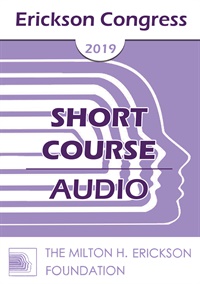
- Average Rating:
- Not yet rated
- Topic Areas:
- Short Courses | Pain and Healing | Sex and Sexuality | Multicultural | Psychotherapy
- Categories:
- Erickson Congress | Erickson Congress 2019
- Faculty:
- Mitra Rashidian, PhD | Robert Jaffe, PhD, LMFT
- Duration:
- 1 Hour 27 Minutes
- Format:
- Audio Only
- Original Program Date:
- Dec 12, 2019
- Short Description:
- According to research (Rashidian et al. 2015), Genito-Pelvic Pain/Penetration Disorder ‘Vaginismus’, causes significant sexual challenges for groups of sub-population women in the US. This workshop provides raw data and statistical analysis, supporting the hypothesis that these women experienced sexual pain as a manifestation of biopsychosocial conditions, resulting from cultural orientations. These include the cultural do’s and don’ts that shapes sub-population women’s sexual beliefs and attitudes, as a result of their life experiences within their cultures, impacting emotional and physical sexual experiences negatively.
- Price:
- $15.00 - Base Price
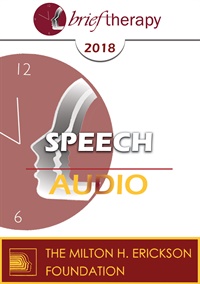
- Average Rating:
- Not yet rated
- Topic Areas:
- Speeches | Marriage | Couples Therapy | Communication
- Categories:
- Brief Therapy Conference | Brief Therapy Conference 2018 | Pioneers in Couples and Family Therapy
- Faculty:
- Michele Weiner-Davis, LCSW
- Duration:
- 38:54
- Format:
- Audio Only
- Original Program Date:
- Dec 09, 2018
- Short Description:
- This session addresses the challenge of mismatched sexual desire, a dynamic that affects one in three couples and can erode both physical and emotional intimacy. It outlines a three-part model: helping the lower-desire partner build empathy, encouraging acts of “real giving” to increase mutual care, and educating couples on the human sexual response cycle. The presentation guides therapists in facilitating open, collaborative conversations to rekindle emotional and sexual connection.
- Price:
- $15.00 - Base Price
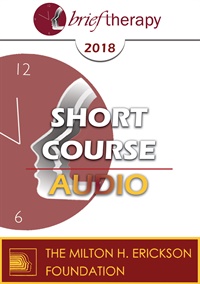
- Average Rating:
- Not yet rated
- Topic Areas:
- Short Courses | Communication | Multicultural | Sex and Sexuality | Brief Therapy
- Categories:
- Brief Therapy Conference | Brief Therapy Conference 2018
- Faculty:
- Mitra Rashidian, PhD
- Duration:
- 1:30:26
- Format:
- Audio Only
- Original Program Date:
- Dec 06, 2018
- Short Description:
- In this workshop, clinicians’ level of comfort, barriers, and attitudes when talking about sexuality will be highlighted, along with useful strategies to provide better engagement with their clients. Additional strategies used to build upon a person’s individual strengths to assist them in overcoming cultural and personal sexual imprints are offered.
- Price:
- $15.00 - Base Price
Credit available - Click Here for more information
- Average Rating:
- Not yet rated
- Topic Areas:
- Addiction | Keynotes | Continuing Education | Love | Couples Therapy | Neuroscience | Sex and Sexuality
- Categories:
- Couples Conference | Couples Conference 2018 | Online Continuing Education
- Faculty:
- Helen E. Fisher, PhD
- Course Levels:
- Master Degree or Higher in Health-Related Field
- Duration:
- 57:05
- Format:
- Audio and Video
- Original Program Date:
- May 04, 2018
- Short Description:
- Biological anthropologist Helen Fisher discusses three brain systems that evolved for mating and reproduction: the sex drive; feelings of intense romantic love; and feelings of deep attachment to a long term partner. She then focuses on her brain scanning research (using fMRI) on romantic rejection and the trajectory of love addiction following rejection. She concludes with discussion of the brain circuits associated with long-term partnership happiness and the future of relationships in the dig
- Price:
-
Sale is $29.00
price reduced from Base Price - $59.00
Credit available - Click Here for more information
- Average Rating:
- Not yet rated
- Topic Areas:
- Clinical Demonstrations | Couples Therapy | Intimacy | Sex and Sexuality | Relationships
- Bundle(s):
- Learning Track - Couples Starter Kit
- Categories:
- Evolution of Psychotherapy | Evolution of Psychotherapy 2017 | Online Continuing Education
- Faculty:
- Esther Perel, MA, LMFT
- Course Levels:
- Master Degree or Higher in Health-Related Field
- Duration:
- 52 Minutes
- Format:
- Audio and Video
- Original Program Date:
- Dec 16, 2017
- Short Description:
- Through podcasts and experiential exercises we will demonstrate clinical work around sexuality and intimacy with couples. Educational Objectives: Identify common blocks to eroticism including the fear of abandonment or entrapment, as well as how our emotional history shapes our erotic blueprint. Describe three strategies to help couples cultivate eroticism and bring a greater sense of aliveness to their relationship.
- Price:
-
Sale is $29.00
price reduced from Base Price - $59.00
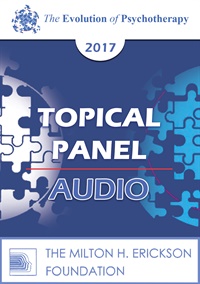
- Average Rating:
- Not yet rated
- Topic Areas:
- Topical Panels | Intimacy | Sex and Sexuality | Couples Therapy | Psychotherapy
- Categories:
- Evolution of Psychotherapy | Evolution of Psychotherapy 2017
- Faculty:
- Sue Johnson, EdD | Otto Kernberg, MD | Peter Levine, PhD
- Duration:
- 59:24
- Format:
- Audio Only
- Original Program Date:
- Dec 15, 2017
- Short Description:
- Sex can create intimacy and intimacy can facilitate sexual expression. The intersection between sex and intimacy will be discussed in described from three different perspectives.
- Price:
- $15.00 - Base Price
Credit available - Click Here for more information
- Average Rating:
- Not yet rated
- Topic Areas:
- Great Debates | Couples Therapy | Conflict | Psychotherapy | Relationships
- Bundle(s):
- Learning Track - EP17 Psychoanalysis Stream
- Categories:
- Evolution of Psychotherapy | Evolution of Psychotherapy 2017 | Evolution of Psychotherapy Psychoanalysis Learning Track | Online Continuing Education | Pioneers in Couples and Family Therapy
- Faculty:
- Otto Kernberg, MD | Harville Hendrix, PhD | Helen LaKelly Hunt, PhD
- Course Levels:
- Master Degree or Higher in Health-Related Field
- Duration:
- 1:26:26
- Format:
- Audio and Video
- Original Program Date:
- Dec 14, 2017
- Short Description:
- This debate contrasts psychodynamic and Imago approaches to couples' conflict. One emphasizes transference and unresolved parental dynamics, while the other focuses on empathy, dialog, and the space between partners. Both highlight the role of childhood wounds in adult relationships and the importance of creating safe, empathetic environments where couples can reconnect and prioritize their relationship.
- Price:
-
Sale is $29.00
price reduced from Base Price - $59.00

- Average Rating:
- Not yet rated
- Topic Areas:
- Couples Therapy | Workshops | Deception | LGBTQ | Boundaries
- Categories:
- Couples Conference | Couples Conference 2017 | Pioneers in Couples and Family Therapy
- Faculty:
- Rick Miller, MSW | Stan Tatkin, PsyD, MFT
- Duration:
- 2:00:09
- Format:
- Audio Only
- Original Program Date:
- Apr 02, 2017
- Short Description:
- The gay male subculture emphasizes easy sexual hookups as a norm, without questioning whether this is actually healthy for a couple. This workshop will define how male couples choose exclusivity successfully, how healthy attachment is an important component for considering an open relationship and provide guidelines for managing open boundaries within a couple. Norms in the subculture will be compared to stereotypical heterosexual couples, including what actually constitutes deception or affairs, and how transform deception to a deeper intimacy.
- Price:
- $15.00 - Base Price

- Average Rating:
- Not yet rated
- Topic Areas:
- Addiction | Workshops | Love | Relationships | Attachment | Couples Therapy | Sex and Sexuality | Attunement
- Categories:
- Couples Conference | Couples Conference 2017
- Faculty:
- Alexandra Katehakis, MA, MFT
- Duration:
- 1:57:10
- Format:
- Audio Only
- Original Program Date:
- Mar 31, 2017
- Short Description:
- Sex addiction destroys trust in relationships, traumatizing the partner, the sex addict, and the family system. Betrayal is an attachment injury that topples the regulatory systems of both parties, and when relational trauma is left untreated, both parties and the family system will suffer. Thus, when acute emotional and physical symptoms become chronic, treatment becomes more difficult making the prognosis for restoring the coupleship poor. Rapid intervention and interactive regulation between the couple is essential for relational healing to begin immediately. Attunement, communication, and empathy (ACE) are the three-pronged stool that supports the long, and sometimes arduous journey to restoring trust.
- Price:
- $15.00 - Base Price

- Average Rating:
- Not yet rated
- Topic Areas:
- Attachment | Workshops | LGBTQ | Relationships | Differentiation | Communication | Intimacy | Sex and Sexuality
- Categories:
- Couples Conference | Couples Conference 2016
- Faculty:
- Rick Miller, MSW
- Duration:
- 01:44:31
- Format:
- Audio Only
- Original Program Date:
- May 15, 2016
- Short Description:
- Gay men face unique challenges regarding intimacy, communication and personal autonomy. Hiding due to being gay along with being raised male, creates a dynamic of distancing as the norm. The goal of psychotherapy is to accept and verbalize vulnerabilities in a context of safety, encourage revealing oneself for the sake of self-acceptance, and to learn how to receive nurturance from others. This workshop will define the art of how to gain connection while maintaining autonomy. There will also be an emphasis on sexuality and how specific attachment styles effects choices related to safety, security and risky sexual practices.
- Price:
- $15.00 - Base Price

- Average Rating:
- Not yet rated
- Topic Areas:
- Emotionally Focused Therapy (EFT) | Workshops | Affairs | Couples Therapy | Sex and Sexuality
- Categories:
- Couples Conference | Couples Conference 2016
- Faculty:
- Scott R. Woolley, PhD
- Duration:
- 01:16:00
- Format:
- Audio Only
- Original Program Date:
- May 14, 2016
- Short Description:
- Engaging withdrawn men in therapy is often challenging, particularly when the man is engaged in compulsive sexual behaviors such as affairs and pornography. Therapists will learn to how to engage withdrawers both with their own internal experience and disowned aspects of the self and with their partner. Therapy video will be used to demonstrate the process.
- Price:
- $15.00 - Base Price
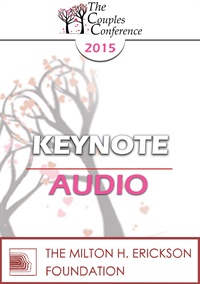
- Average Rating:
- Not yet rated
- Topic Areas:
- Couples Therapy | Attachment | Keynotes | Anxiety | Intimacy | Sex and Sexuality | Love
- Categories:
- Couples Conference | Couples Conference 2015
- Faculty:
- Esther Perel, MA, LMFT
- Duration:
- 57:21
- Format:
- Audio Only
- Original Program Date:
- Apr 25, 2015
- Short Description:
- This bold take on intimacy and sex grapples with the obstacles and anxieties that arise when our need for secure love conflicts with our pursuit of passion. We will tackle eroticism as a quality of vitality in relationships extending far beyond mere sexuality and show how reconciling these two competing needs is at the heart of sustaining desire over time. We will address paradoxes of desire and how social forces inhibit erotic expression; attachment history and the erotic blueprint.
- Price:
- $15.00 - Base Price

- Average Rating:
- Not yet rated
- Topic Areas:
- Couples Therapy | Infidelity | Sex and Sexuality | Workshops | Love | Intimacy
- Categories:
- Couples Conference | Couples Conference 2015
- Faculty:
- Esther Perel, MA, LMFT
- Duration:
- 1:40:17
- Format:
- Audio Only
- Original Program Date:
- Apr 25, 2015
- Short Description:
- Through case examples, Esther Perel will show how to effectively engage such issues as intimacy, sexuality and infidelity by creating separate spaces where each partner can explore his/her feelings and experiences along with larger relationship dynamics. We will show how to navigate privacy and secrecy, honesty and transparency, stage interventions around sexual impasses, and structure a safe and flexible therapeutic environment to work effectively with infidelity.
- Price:
- $15.00 - Base Price

- Average Rating:
- Not yet rated
- Topic Areas:
- Couples Therapy | Workshops | Love | Relationships | Addiction | Sex and Sexuality | Trauma | Attunement | Communication
- Categories:
- Couples Conference | Couples Conference 2015
- Faculty:
- Alexandra Katehakis, MA, MFT
- Duration:
- 1:55:21
- Format:
- Audio Only
- Original Program Date:
- Apr 25, 2015
- Short Description:
- Sex addiction destroys trust in relationships, traumatizing the partner, the sex addict, and the family system. Relational trauma left untreated will have both parties and the entire system crumbling. Attunement, communication, and empathy (ACE) are the three pronged stool that supports the long, and sometimes arduous, journey to restoring trust. The goal is to recognize the signs of relational trauma in both parties, and compare the difference between relational trauma and co-dependence
- Price:
- $15.00 - Base Price

- Average Rating:
- Not yet rated
- Topic Areas:
- Couples Therapy | Workshops | Intimacy | Love | Sex and Sexuality
- Categories:
- Couples Conference | Couples Conference 2015
- Faculty:
- Esther Perel, MA, LMFT
- Duration:
- 1:27:43
- Format:
- Audio Only
- Original Program Date:
- Apr 25, 2015
- Short Description:
- Why does great sex so often fade for couples who claim to love each other as much as ever? Why doesn’t good intimacy guarantee good sex? When you love , how does it feel and when you Desire how is it different? Loss of Desire brings many people into our offices. It is the prime sexual complaint that leads relational unhappiness, infidelity and even divorce. For the most part, sexuality has been relegated to sex therapy and couple therapy has been a desexualized practice. Yet, love in our digital age puts sex at the center of couples’ lives.
- Price:
- $15.00 - Base Price
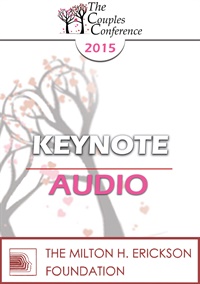
- Average Rating:
- Not yet rated
- Topic Areas:
- Couples Therapy | Sex and Sexuality | Keynotes | Intimacy | Relationships
- Categories:
- Couples Conference | Couples Conference 2015
- Faculty:
- Pat Love, EdD
- Duration:
- 53:58
- Format:
- Audio Only
- Original Program Date:
- Apr 24, 2015
- Short Description:
- Our natural sexual setpoint explains a lot about arousal, desire and intimate satisfaction. We will explore this issue with research, facts and humor, with the objectives of understanding the effects of estrogen on desire and the effects of testosterone on desire.
- Price:
- $15.00 - Base Price
- Average Rating:
- Not yet rated
- Topic Areas:
- Keynotes | Couples Therapy | Intimacy | Sex and Sexuality | Attachment | Love
- Categories:
- Brief Therapy Conference | Brief Therapy Conference 2014
- Faculty:
- Esther Perel, MA, LMFT
- Course Levels:
- Master Degree or Higher in Health-Related Field
- Duration:
- 59:13
- Format:
- Audio and Video
- Original Program Date:
- Dec 13, 2014
- Short Description:
- Based on Perel’s Mating in Captivity, this bold take on intimacy and sex grapples with the obstacles and anxieties that arise when our need for secure love conflicts with our pursuit of passion. We will tackle eroticism as a quality of vitality in relationships extending far beyond mere sexuality and show how reconciling these two competing needs is at the heart of sustaining desire over time.
- Price:
-
Sale is $29.00
price reduced from Base Price - $59.00

- Average Rating:
- Not yet rated
- Topic Areas:
- Sex and Sexuality | Workshops | Brief Therapy | Couples Therapy | Intimacy | Relationships
- Categories:
- Brief Therapy Conference | Brief Therapy Conference 2014
- Faculty:
- Pat Love, EdD
- Duration:
- 1:42:06
- Format:
- Audio Only
- Original Program Date:
- Dec 12, 2014
- Short Description:
- Human sexual response is a complex system even when attempting to understand one person let alone two people in a relationship. It is helpful, therefore to have a way to organize decades of research and clinical practice in a manner which can be shared with clients. A practical schema will be presented to educate and motivate clients interested in improving their intimate connection. Lecture, video, original handouts and experiential exercises will be utilized.
- Price:
- $15.00 - Base Price
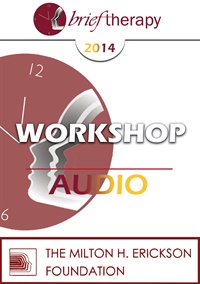
- Average Rating:
- Not yet rated
- Topic Areas:
- Couples Therapy | Infidelity | Sex and Sexuality | Workshops | Love | Brief Therapy
- Categories:
- Brief Therapy Conference | Brief Therapy Conference 2014
- Faculty:
- Esther Perel, MA, LMFT
- Duration:
- 1:32:45
- Format:
- Audio Only
- Original Program Date:
- Dec 12, 2014
- Short Description:
- Through case examples, Esther Perel, MA, LMFT will show how to effectively engage such issues as intimacy, sexuality and infidelity by creating separate spaces where each partner can explore his/her feelings and experiences along with larger relationship dynamics. We will show how to navigate privacy and secrecy, honesty and transparency, stage interventions around sexual impasses, and structure a safe and flexible therapeutic environment to work effectively with infidelity. Provide a multicultural perspective on differing notions of love, marriage and sexual behaviors, and to highlight the relationship between culture and sexuality.
- Price:
- $15.00 - Base Price
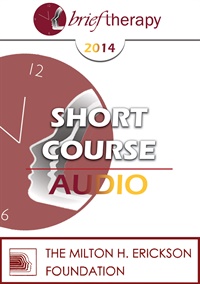
- Average Rating:
- Not yet rated
- Topic Areas:
- Consciousness | Trauma | Sex and Sexuality | Short Courses | Meditation, Spirituality and Yoga | Family Constellations | Experiential Therapy
- Categories:
- Brief Therapy Conference | Brief Therapy Conference 2014
- Faculty:
- Emily Volden, MSW, LICSW | Dan Booth Cohen, PhD
- Duration:
- 1:26:22
- Format:
- Audio Only
- Original Program Date:
- Dec 11, 2014
- Short Description:
- Family Constellations can be used in therapy as a process for treating sexual trauma. The experiential process accesses the heart as an organ of perception to explore, heal, and release sexual trauma while reclaiming clients’ empowered sexual selves. Employing a light meditation, therapist and client open the doors of awareness to ancestral and archetypal consciousness.
- Price:
- $15.00 - Base Price



